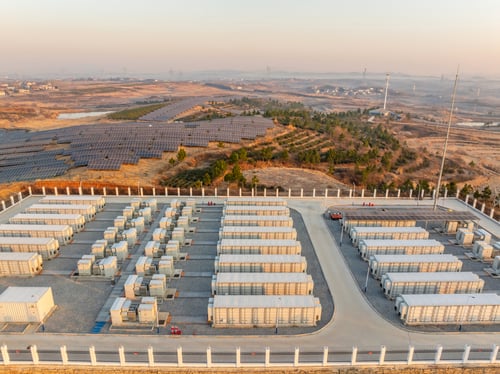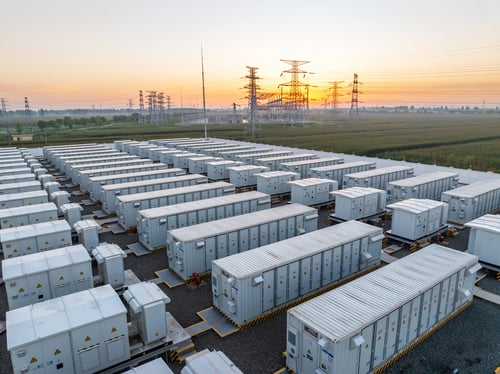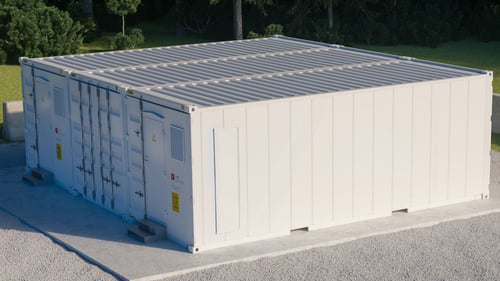The Greek BESS Opportunity: One Market Won’t Do

Not all eggs in one basket has become the key to success for grid-scale battery storage systems (BESS). In more mature markets like the Nordics, battery projects are moving beyond short-term, single-market strategies and turning to multi-market optimisation. But what about up-and-coming countries like Greece? While the drivers, challenges, and market structure are specific to the country, all signs point to the same conclusion: multi-market optimisation is essential for the long-term success of grid-scale BESS projects.
Big Opportunity in the Greek Market
In the Nordics, saturation in frequency response markets like FCR has forced battery owners to diversify into deeper markets such as mFRR, aFRR, and the wholesale space. In Greece, the story starts at a different stage.
While the balancing markets (like aFRR & mFRR) will be a very interesting source of revenues, a big part of BESS will also count on wholesale. As BESS volumes will be increasing, their participation will also be increasingly shifting towards wholesale energy trading. As new balancing schemes (PICASSO for aFRR and MARI for mFRR) roll out and regulatory conditions evolve, the Greek market is opening up to more complex and rewarding trading opportunities.
Greece’s flexibility needs are increasing. As renewables expand and grid conditions grow more volatile, batteries must evolve from merely participating in balancing markets to actively optimising across the value stack, from mFRR to day-ahead and intraday trading.
Why Multi-Market Optimisation is Crucial for Greece
In Greece, several dynamics reinforce the need for a multi-market approach:
- Balancing markets alone won’t be enough: While balancing services like aFRR and mFRR remain viable revenue streams today, they are shallow in depth and can be unpredictable in activation frequency and duration. FCR offers only capacity payments and currently remains relatively small in scope, but there are some further encouraging initiatives connected with FCR for the future.
- Wholesale markets offer growing potential: As the shift to 15-minute trading windows takes hold across Europe, including in Greece, BESS owners will find increased arbitrage potential in the wholesale markets. This shift allows energy to be bought low and sold high within compressed timeframes, which is critical for short-duration storage assets.
- Revenue stacks are evolving: A strong BESS business case in Greece must account for deeper, energy-based revenue opportunities. Projects relying solely on wholesale or single-market plays risk underperformance as market dynamics shift.
- Grid volatility = opportunity: With the increase in variable renewable energy (especially solar in southern regions of Greece), price spreads in balancing markets are becoming more pronounced, thereby creating fertile ground for advanced BESS strategies.
To circumvent saturation, you need access to and optimisation across multiple energy markets, both balancing and wholesale.
In terms of balancing costs, most of the expenses in Greece (which also means the income for the participants) come from energy, setting Greece apart from others with very active programs. This means that while a lot of income is expected from capacity, there will also be a big chance to earn money from energy-based revenues. Highly activated products promote the value of the real-time dispatch selection optimizer to maximize revenues based on the assets' SOC. Then it comes to the potential saturation effect, promoting the need for value-stacking between ancillary services and wholesale market participation.
Lessons from the Nordics Applied to Greece
In mature markets like the Nordics, early profits from FCR are already declining. Greece still offers strong value in balancing markets, but this won’t last forever. Multi-market strategies aren't just a ‘nice-to-have’, they're the path to securing investment, optimising asset life, and maximising ROI over a BESS project’s 10-15 year lifespan.
One crucial insight from the Nordics is that prequalification processes, battery state-of-charge management, and market participation strategy must all be handled by experienced partners. As BESS trading complexity increases, working with a seasoned optimiser becomes a core part of the business case.
What makes a great optimiser
As Greece’s BESS market matures, selecting the right optimiser becomes a key decision for ensuring long-term project success.
Many developers can underestimate the complexity of operating a BESS project. The success of the project depends on more than just getting prequalified and trading - it requires deep market understanding, sophisticated forecasting, as well as the technical knowledge to quickly adapt to changing market conditions. As Greek flexibility markets mature, the role of the optimiser evolves from trader to strategic partner.
Great BESS optimisers are able to reduce project risks across every phase - from prequalification to revenue performance and asset health. Here are some key things to look for:
- Revenue maximisation: Maximise returns by trading across all layers of the energy stack - balancing (mFRR, aFRR), wholesale (day-ahead, intraday).
- Market access: Great BESS optimisers unlock participation in new and changing markets, such as aFRR (via PICASSO) or 15-minute wholesale windows, ensuring the battery stays competitive as market conditions shift.
- Risk reduction: They protect battery health with advanced SoC (State of Charge) strategies, minimise degradation, and avoid fines from under-delivery.
- Bankability: Support long-term project finance with reliable, data-driven business cases and clear revenue modelling.
In short, the BESS optimiser becomes a key differentiator in financial performance. In order to maximise revenues between high-opportunity and highly-activated energy and capacity reserve products in balancing together with wholesale markets, only optimisers that are capable of sophisticated, cross-market trading will deliver consistent returns.
Sympower, for instance, was the first to operate a dispatchable portfolio in Greece’s mFRR market. With experience managing 2.5GW of flexible assets across Europe - including in mature markets like the Nordics - we’ve developed the expertise and tools to guide Greek BESS owners through the next phase of market evolution.
From forecasting and bidding to advanced algorithmic trading and prequalification support, our platform helps unlock stacked value while managing risks like battery degradation, market saturation, and grid congestion costs. You can explore our battery optimisation solutions for more detail.
Watch the Nordics & Greek Webinars
Want to dive deeper into the insights from either our Nordics or our Greece-focused webinar? Watch the webinar recordings here (Nordics) and here (Greece) to explore how multi-market optimisation is shaping the future of BESS, and how you can benefit.
Want to find out more about different BESS revenue models? Check out our overview of BESS revenue-models.
Other articles you might find interesting
-
.jpg?length=500&name=electric%20boiler%20(2).jpg) BESS2 July 2025
BESS2 July 2025Australia’s Battery Blueprint: Lessons for Europe’s BESS Developers from a Global Market Leader
Read more -
.jpg?length=500&name=electric%20boiler%20(1).jpg) BESS2 July 2025
BESS2 July 2025Beyond revenue potential: navigating the technical complexities of BESS optimisation
Read more -
 BESS2 July 2025
BESS2 July 2025Maximise Battery Revenue: How to Build a Successful Business Case
Read more -
 BESS2 July 2025
BESS2 July 2025Unlocking BESS’ Full Potential: Why Multi-Market Trading is the Future
Read more -
 BESS2 July 2025
BESS2 July 2025Maximising BESS Earnings: 5 Key Revenue Models
Read more -
 BESS2 July 2025
BESS2 July 2025Harnessing BESS’ Potential in the Nordics: Key Insights from our Webinar
Read more -
 BESS2 July 2025
BESS2 July 2025What is Battery Storage?
Read more
